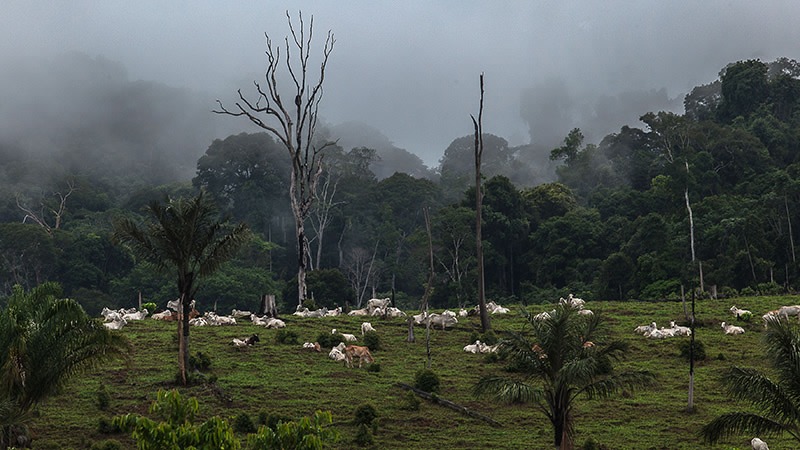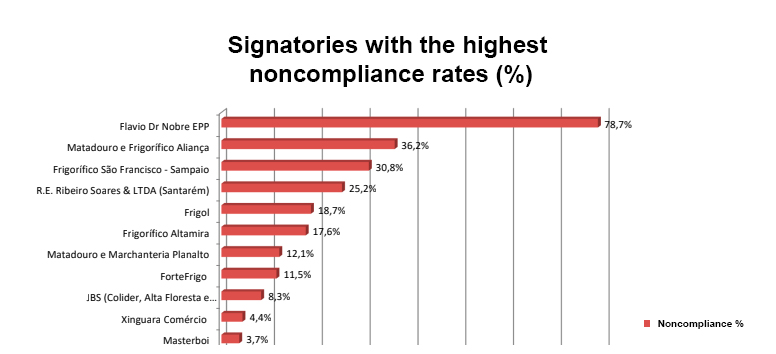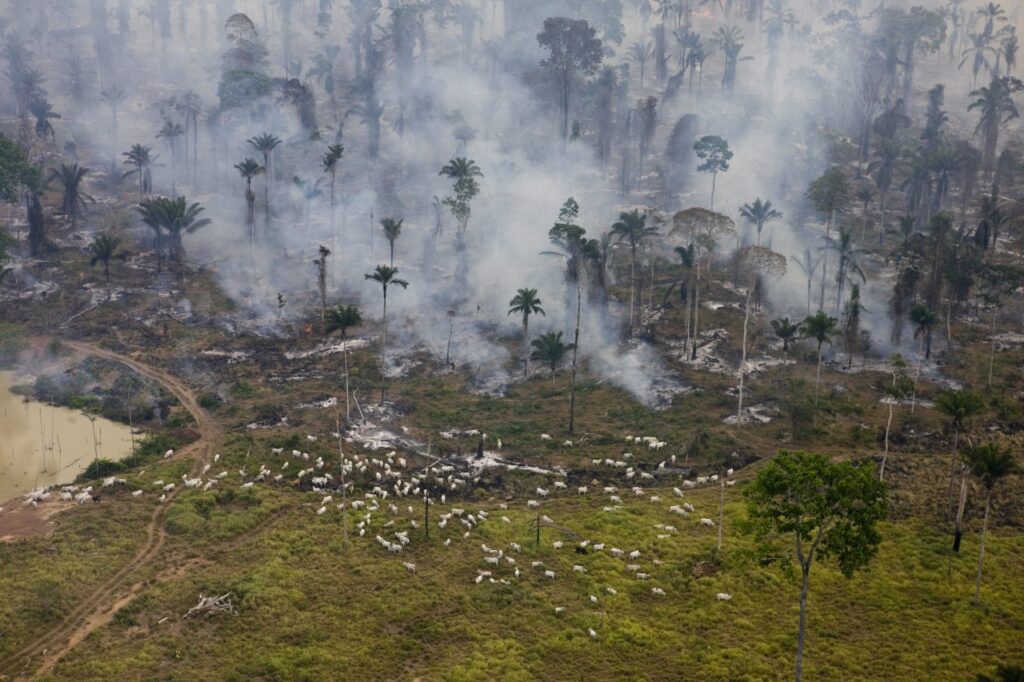Brazilian banks Itaú, BNDES, Banco do Brasil and Safra financed at least four of the meatpacking companies that contributed most to illegal deforestation in the Amazon. Between 2013 and 2019, the four banks’ funding operations with the meatpackers amounted to US$ 6.7 million. The data are provided by the Forests&Finance platform maintained by an international coalition of NGOs that includes Repórter Brasil. Its new update provides information on Brazilian financial institutions.
Together, meatpackers Ribeiro, Fortefrigo and Masterboi bought about 27,000 head of cattle from areas with evidence of irregularities, according to official audits conducted by the Federal Prosecution Service (MPF). The cattle trade operations took place in 2017.

August 2019 to July 2020 , the state of Pará accounted for nearly half of the deforestation of the Amazon rainforest region. Photo: (Lilo Clareto/Repórter Brasil)
The audit points out that the three meatpackers are among the ten companies that have most often deviated from the socio-environmental commitments they signed under the Conduct Adjustment Agreement for the Meat Industry (TAC da Carne) – with the Federal prosecution Service in Pará, starting in 2009.
Financial support
Frigorífico Ribeiro (R. E. Ribeiro Soares): from 2013 to 2014, under the Investment Support Program, Bradesco loaned US$ 139,000 for the company to purchase trucks and buses. Banco do Brasil, in turn, loaned US$ 1.5 million for items not listed on the database. According to data provided by the Federal Prosecution Service, 20% of the animals purchased – more than 6,000 head of cattle – came from farms with evidence of irregularities.
Fortefrigo: in 2019, the company received US$ 264,000 from Banco do Brasil under Finame, a credit line for machinery and equipment purchases. According to data provided by the Federal Prosecution Service, 11.5% of the animals purchased – more than 14,000 head of cattle – came from areas with evidence of irregularities.
Masterboi: From 2013 to 2016, the meatpacker received US$ 4.2 million from Itaú Unibanco to buy equipment, machinery, buses and trucks, in addition to items not listed on the platform. In 2013, it received US$ 524,000 from Banco do Brasil for unlisted items and US$ 82,000 from Banco Safra. According to data provided by the Federal Prosecution Service, 3.5% of the animals purchased – 5,500 head of cattle – came from properties with evidence of irregularities.
When contacted by Repórter Brasil, Itaú and Banco do Brasil preferred not to comment and only Bradesco replied, stating that it adopts comprehensive socioenvironmental criteria to analyse all its customers. See full note.
The Meat Industry Conduct Adjustment Agreement does not extend its socio-environmental commitments to the banks that fund the industry. “There is little regulation on the responsibility of financial institutions in the country,” says Federal Prosecutor Daniel Azeredo, who led the process of designing the commitments. “What we have are some legal efforts to make banks answer for their decisions about who and what they fund.”
Below, a Federal Prosecution Service chart showing percentages of cattle with illegal origin purchased by the meatpackers that had pledged to take responsibility for their suppliers.

Source: Federal Prosecution Service Ministry (2019; 2017 inspection report)
In addition to being negatively listed on the MPF audit, the meatpacking companies mentioned in this report have been the focus of investigations conducted by Repórter Brasil. In 2020, for example, Masterboi supplied one of its processing plants with cattle from the Ângelo Farm in the state of Tocantins, which had been interdicted since 2008 by Ibama.
Production in the area had been interdicted by the federal inspection agency as a result of illegal deforestation to create pastures. The origin of the cattle, however, was not real. The animals were registered under the Rural Environmental Register (CAR) number of a “clean” property, free of interdictions.
Read more:
— O ‘boi pirata’ criado em terra indígena e a conexão com os frigoríficos Marfrig, Frigol e Mercúrio
— Relatório: Filé no supermercado, floresta no chão
All those mentioned here were contacted by Repórter Brasil. Frigorífico Ribeiro and Fortefrigo had not answered our questions on the date of publication. Masterboi stated in a note that it follows strict practices to monitor its suppliers in compliance with the Federal Prosecution Service and has no current “incidence of violations.” See full note.
The Conduct Adjustment Agreement for the Meat Industry (TAC)
Companies started signing the Meat Agreement 12 years ago in Pará, as a way to reduce the alarming rates of Amazon rainforest destruction. Studies show that livestock expansion accounts for 65% of all deforestation in the Brazilian Amazon.
Overseeing this link in the supply chain was strategic, says Rafael da Silva Rocha, a federal prosecutor who closely monitors the Agreement. “There are thousands of farms and deforestation hotspots, but the cattle invariably go through meatpacking companies, and then we managed to create some pressure,” he explains.
After more than a decade, the state of Pará accumulates almost half of the deforestation recorded in the Amazon between August 2019 and July 2020 (more than 5,000 kilometres – include precise figure here).
Social problems are added to environmental ones. The results of the latest Federal Prosecution Service audits published in 2019 show that meatpackers still buy cattle from properties caught employing slave labour, farms interdicted by inspection agencies, and cattle grazing on indigenous and quilombola territories, as well as conservation areas.
Read more: Amazônia: como criadores de gado driblam acordo com MPF e incentivam desmatamento
In addition to the 27,000 head of cattle found with irregular origin by the Federal Prosecution Service, Daniel Azeredo, a federal prosecutor and a member of the Legal Amazon working group, warns about farmers’ schemes concocted to circumvent the Agreement.
Cattle raised on farms interdicted or included in the “dirty list” of slave labour are often registered as belonging to other farms. Another method employed by farm owners that escapes inspections is the indirect supply chain. “Cattle are raised on irregular farms and then sent to ‘clean’ farms for fattening before being sold to meatpackers,” Azeredo explains.
Leia mais: Rota do gado
In July last year, a new clause was added to the Meat Industry Conduct Adjustment Agreement in order to curb cattle transfers used to evade inspections: meatpackers now can only purchase three animals per hectare. This new protocol is designed to avoid cattle purchases from farms that receive animals from irregular properties for resale.
Editor’s note: This article was updated on June 9 to correct references to the Frigol meat processing plant. The company contacted Repórter Brasil after the publication to inform that the reference to “Finame” in its annual financial report did not refer to the BNDES credit line, as initially considered by the Forests & Finance platform, but to another type of international financing, with a similar name. The platform managers reviewed the data and made the correction. Repórter Brasil removed mentions of Frigol from the text. The company had been contacted by Repórter Brasil during the investigation for this article, but did not respond at the time. Check the note sent by the company here.

